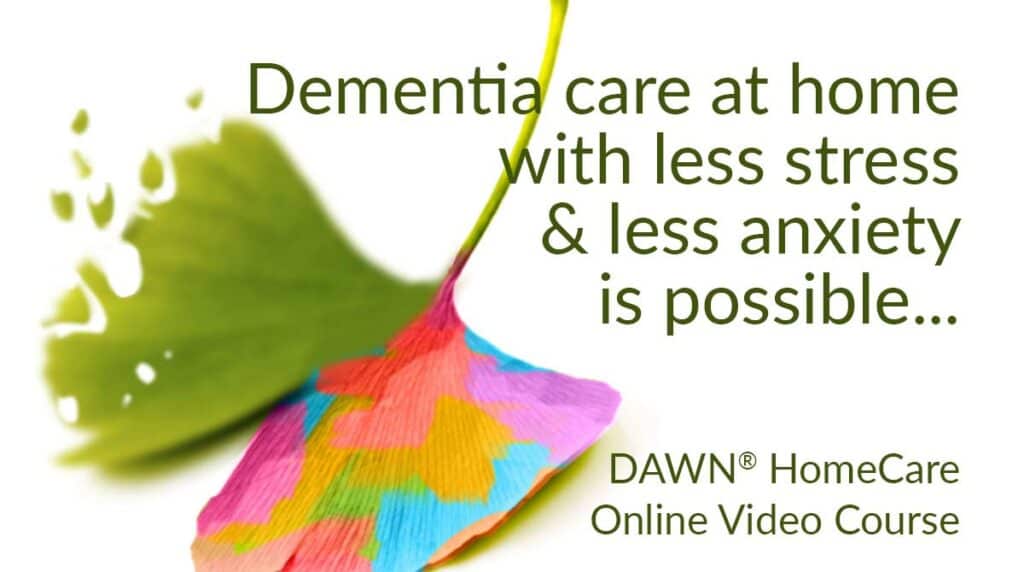Music reaches all of us emotionally. It can bring tears to our eyes, give us goosebumps, grate on our ears, calm us, or send us out of the room. People with dementia respond to music just as surely as people with healthy brains. We don’t need rational thought to respond to music.
But rational thought is necessary to play a CD on the stereo or find your favorite music channel on the television. How can we help our loved ones who have dementia continue to access and enjoy the music that brings them enjoyment and comfort?

I’m not very technical. In my home, I still have a much-loved stereo and collection of CDs. At work, I have one of the original iPods loaded with my CD collection. Every day at work and at home I use my memory and thinking skills to operate my stereo and iPod to play my favorite tunes. If you are with your loved one daily, you can use your skills to keep music in his or her life as well. But without help, people with dementia become cut off from music.
Use the existing stereo or television
With clients in the earlier stages, we have created CDs with a collection of their favorite pieces and they have been able, for a time, to put that one CD in a player by themselves. We also tune their televisions to their favorite music stations: most cable services include music stations so that you can select the ones your loved one enjoys.
Graduate to an iPod shuffle or MP3 player
Follow Dan Cohen’s lead and turn to iTunes (see his work at musicandmemory.org) and iPod shuffles, or another type of MP3 player. Choose one that will shuffle (randomly play whatever is loaded on it) and has only an on/off button, so that your loved one can operate it successfully. Buy two. Load one with the music your loved one finds entertaining and the other with a selection of music that he or she finds calming and comforting.
NOTE: iPod shuffles are now discontinued, but you can still purchase them used. If there is a particular model of MP3 player that your loved one is using successfully, buy some extra ones as backups in case one fails. There are also some newer, simple devices that are made especially for people with dementia (or for kids) that can be loaded with music. Search on “one button MP3 player” for more ideas.

We’d also like to mention, Norman McNamara (Norrm) and his Purple Angel MP3 Campaign. Norrm has been taking donated MP3 players, loading them with music and then sending them to those (in the UK) who need them. What a wonderful idea! There is much more to check out at Norrm’s website including the World Rocks Against Dementia music event in July.
Update the television with a streaming device
There is a world of music accessible with a smart TV or streaming device. I invested in a Roku device (which cost me less than $50). The two channels I get the most enjoyment from are Pandora, a free music streaming app, and YouTube, which can provide hours of long-running audio/video selections of music or nature. With Pandora, you create individual music channels and then train Pandora to play the music you like by clicking like or dislike with the remote. You can quickly and easily set up Pandora to provide an array of channels with music that meet your loved one’s every need.
Bring nature to them, as well as music
YouTube provides thousands of selections of music, but also birdsong, babbling brooks, forests, lakes, beaches—anything you can imagine in the natural world. By playing a selection, you prompt YouTube to offer you similar selections. I now have YouTube trained to offer me crackling fires for chilly mornings, birdsong in meadows and gardens, sunsets over gentle waves, waterfalls and forest walks, all with just a few clicks of the remote. If you’ve ever wondered what a nightingale sounds like, try clicking on this nightingale song track from the Silent Watcher on YouTube for three hours of beauty that delight both eye and ear.
You can use YouTube videos streamed on any television to bring the beauty of music and nature into your loved one’s room in a care facility or living room at home. All you need is internet access. Music adds beauty, stirs happy memories, and brings fulfillment into our lives. Let’s keep it in our loved ones’ lives when they become unable to do so themselves.
§

FAQs about music and dementia
What is the best music for dementia (and for people with Alzheimer’s)?
A person who is experiencing dementia or Alzheimer’s is still the same person they always were, except that their cognitive skill set is becoming more limited. However, although people lose language and rational thinking skills, they do not lose their intuitive thinking skills, which enable them to enjoy art, beauty and music. Music is one of the most personal forms of beauty. Usually there is a genre or two that we prefer, and several albums or CDs from our favorite genres that we really enjoy, and then there are maybe a dozen songs that lift our hearts and get us singing out loud. Search out those songs and put them on an MP3 player for your loved one to listen to with headphones. You’ll find that using headphones makes the music come alive in a way that playing it in the room doesn’t.
Does music awaken people with Alzheimer’s disease?
People who are experiencing Alzheimer’s or dementia will eventually become unable to communicate with words and less able to move. During the final stages it becomes difficult to tell whether the person is conscious of their surroundings and companions. However, if you play their favorite songs for them on headphones, so that they hear the music within themselves rather than in the room, they often become able to move and talk again for a time. Each of us have a few songs that move our hearts and have profound meaning for us from earlier times in our lives. If you search out those songs for a loved one who’s experiencing dementia, you will find joy for both of you. (And you can do the same thing by telling them their favorite memories like bedtime stories using their own favorite words and phrases.)
What are the benefits of music for Alzheimer’s and dementia?
When we begin to experience dementia or Alzheimer’s, we begin losing not only our memory skills but also our rational thinking skills and some attention skills. These losses eventually make it impossible for us to initiate activities, complete tasks, perceive risk, or recall happier times. However, we keep our intuitive thinking skills and the ability to enjoy everything other people bring into our presence. We only need intuitive thinking skills to enjoy beauty, positive emotions, and music. For each of us, there are a few songs that bring tears to our eyes, lift our hearts, or start our hands clapping and feet tapping. If our companions understand that, and play our favorite music for us in headphones, they can bring us love, laughter and joy, and warm our hearts, despite dementia.

